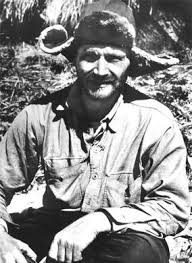Seven Years in Tibet (revisited)
 I’ve just been re-reading this book, which I read for the first time last year. It still made a profound impression on me and I felt curious to find out more about Heinrich Herrer. As he didn't die until 2006, aged, I think, 93, there are obituaries and also plenty of biographical material about him on the Internet.
I’ve just been re-reading this book, which I read for the first time last year. It still made a profound impression on me and I felt curious to find out more about Heinrich Herrer. As he didn't die until 2006, aged, I think, 93, there are obituaries and also plenty of biographical material about him on the Internet.
The publication of the book, in fact, brought him much acclaim both as a travel writer and mountaineer but also prompted people to investigate his past. As a very young man he had been a member of the SS but always averred that it was only because he was thereby offered the chance to become a ski instructor and trainer and that he had no political or ideological commitment to the organistation or the Nazi party.
All this has been well chewed over, especially by anti-Nazi propagandists who can get extremely worked up about people of Herrer's background. Added to that, he became a close friend of the Dalai Lama during his time in Tibet, a friendship which continued and was cemented suring the latter's exile. The fact that the Dalai Lama apparently had friends and supporters among ex-Nazis added fuel to th e fire although some might think that the Dalai Lama would welcome friends of any persuasion. In the end I felt that the question of Herrer's past and suspected political leanings didn't detract from the achievement which the book represents.
e fire although some might think that the Dalai Lama would welcome friends of any persuasion. In the end I felt that the question of Herrer's past and suspected political leanings didn't detract from the achievement which the book represents.
When I'd finished the book, I began to think more about Peter Aufschnaiter, who is something of a shadowy figure in Herrer's narrative. (He's shown in the accompanying photo, taken while he was serving in the War.) He was Herrer's co-escapee from Derha Dun prison and his companion over the years of their escape and travels through Tibet to reach Lhasa. Resorting to the Internet again (of course), I found quite a bit of material about him. He was a very different character, more solitary and completely immersed in his work and his passionate calling as an explorer and mountaineer. For much of the time that he and Herrer were in Tibet together, Aufschnaiter lived outside Lhasa, working on various engineering projects for the government.
In 1951, Herrer left Lhasa and went straight to Nepal, whereas Aufschnaiter continued to travel around Tibet, exploring and mapping previously unknown areas and climbing. During this time he lived with local people in all the areas he visited, including with some nomadic tribes, thereby gaining a unique insight into their lives and customs. He left Tibet the following year, due to the Communist take-over, but only returned to Europe after twenty years absence.
Herrer achieved fame and recognition because of the publication of Seven Years in Tibet, in 1953, whereas Aufschnaiter published only some papers and articles during his life-time. On his death in the 70s, his friend Martin Brauen, of the Ethnological Museum, University of Zurich, compiled, collated and edited the voluminous notes and journals, and, importantly, photographs, which Aufschnaiter kept during his travels. These were published in 2002, by a small Bangkok publishing house specialising in Asian titles, under the title Peter Aufschnaiter's Eight Years in Tibet and I was able to buy it on-line.
This book is NOT the travel classic which Herrer's book is. But it IS a unique and gripping picture of life and times in Lhasa and the rest of Tibet before the Chinese invasion. It also reveals Aufschnaiter as a dedicated and passionate explorer and climber, and a meticulous recorder of all his observations and map-makings. There's a lot of technical detail about the mountains and general terrain, which can become a bit tedious for the non-explorer/mountaineer, but it's also full of fascinating observation of the people and life-styles he encounters in his travels. It's illustrated throughout by Aufschnaiter's wonderful photographs. The style and editing are rather choppy but I enjoyed it nonetheless and felt it enhanced and enlarged upon my reading of the Herrer account.
 e fire although some might think that the Dalai Lama would welcome friends of any persuasion. In the end I felt that the question of Herrer's past and suspected political leanings didn't detract from the achievement which the book represents.
e fire although some might think that the Dalai Lama would welcome friends of any persuasion. In the end I felt that the question of Herrer's past and suspected political leanings didn't detract from the achievement which the book represents.When I'd finished the book, I began to think more about Peter Aufschnaiter, who is something of a shadowy figure in Herrer's narrative. (He's shown in the accompanying photo, taken while he was serving in the War.) He was Herrer's co-escapee from Derha Dun prison and his companion over the years of their escape and travels through Tibet to reach Lhasa. Resorting to the Internet again (of course), I found quite a bit of material about him. He was a very different character, more solitary and completely immersed in his work and his passionate calling as an explorer and mountaineer. For much of the time that he and Herrer were in Tibet together, Aufschnaiter lived outside Lhasa, working on various engineering projects for the government.
In 1951, Herrer left Lhasa and went straight to Nepal, whereas Aufschnaiter continued to travel around Tibet, exploring and mapping previously unknown areas and climbing. During this time he lived with local people in all the areas he visited, including with some nomadic tribes, thereby gaining a unique insight into their lives and customs. He left Tibet the following year, due to the Communist take-over, but only returned to Europe after twenty years absence.
Herrer achieved fame and recognition because of the publication of Seven Years in Tibet, in 1953, whereas Aufschnaiter published only some papers and articles during his life-time. On his death in the 70s, his friend Martin Brauen, of the Ethnological Museum, University of Zurich, compiled, collated and edited the voluminous notes and journals, and, importantly, photographs, which Aufschnaiter kept during his travels. These were published in 2002, by a small Bangkok publishing house specialising in Asian titles, under the title Peter Aufschnaiter's Eight Years in Tibet and I was able to buy it on-line.
This book is NOT the travel classic which Herrer's book is. But it IS a unique and gripping picture of life and times in Lhasa and the rest of Tibet before the Chinese invasion. It also reveals Aufschnaiter as a dedicated and passionate explorer and climber, and a meticulous recorder of all his observations and map-makings. There's a lot of technical detail about the mountains and general terrain, which can become a bit tedious for the non-explorer/mountaineer, but it's also full of fascinating observation of the people and life-styles he encounters in his travels. It's illustrated throughout by Aufschnaiter's wonderful photographs. The style and editing are rather choppy but I enjoyed it nonetheless and felt it enhanced and enlarged upon my reading of the Herrer account.

1 comment:
nice piece on a "forgotten" man
Post a Comment